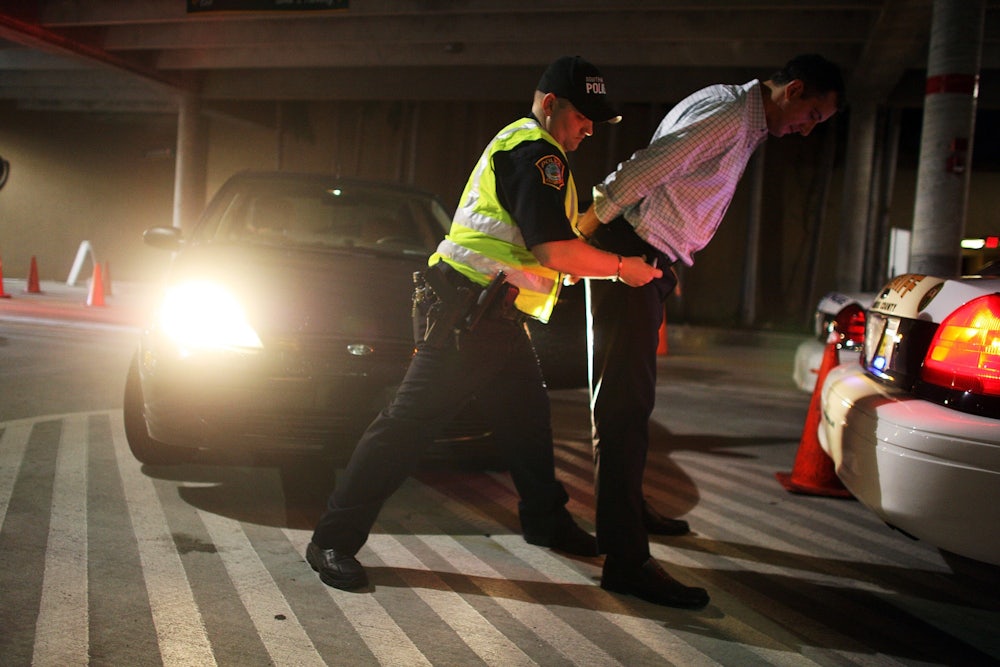The state of Indiana really wants to take Tyson Timbs’s Land Rover, as punishment for dealing just a few hundred dollars’ worth of drugs. He’s now asking the U.S. Supreme Court to let him keep it.
Stories about civil forfeiture injustices are unfortunately common. What sets Timbs’s case apart is his legal argument: that the Eighth Amendment’s ban on excessive fines should shield his property from confiscation at the state level. If the Supreme Court takes up the case and agrees, the justices could impose some much-needed barriers on state and local governments’ voracious appetites for fees, fines, and forfeitures.
Timbs’s personal story is a familiar one amid America’s opioid epidemic. He was prescribed hydrocodone to alleviate the pain from a back injury caused at work. But after the pills ran out, his lawyers said in a petition to the Supreme Court in January, did Timbs pursue a more dangerous high: heroin.
For a time, Timbs conquered his addiction. But things fell apart again after his father died. A life-insurance policy left Timbs with roughly $73,000, of which he spent just over $41,000 to buy a Land Rover LR2. “With a new Land Rover and more than $31,000 left to spend, [he] began driving the vehicle to Richmond, Indiana, and Ohio—sometimes on a daily basis—to buy heroin for his personal use,” his lawyers told the court.
Undercover officers solicited from Timbs, buying just under four grams of heroin for less than $400. He was arrested and charged with dealing a controlled substance and conspiracy to commit theft. Timbs pleaded guilty and received a six-year sentence to be served outside prison walls. The state also tried to seize his Land Rover, kicking off the legal battle that ultimately brought him to the Supreme Court.
The trial court refused to authorize the seizure. Indiana law only allowed a $10,000 fine for Timbs’s sentence, and the court concluded that seizing a vehicle worth four times as much as that threshold would be “grossly disproportionate” relative to Timbs’s crime. The Indiana Court of Appeals upheld the decision after their own review of the circumstances. But the Indiana Supreme Court intervened and approved the seizure.
The judges’ unanimous opinion rested on a precedent, or lack thereof: The U.S. Supreme Court has never applied the Eighth Amendment’s Excessive Fines Clause to the states. Other lower courts have chosen to do so without waiting for the top justices, but Indiana’s Supreme Court was uninterested in following that path for Timbs’s benefit. “Indiana is a sovereign state within our federal system, and we elect not to impose federal obligations on the State that the federal government itself has not mandated,” the court declared.
Timbs, with his petition in January, is now asking the U.S. Supreme Court to overturn that ruling. Doing so would require only a little bit of constitutional legerdemain on the high court’s part. In the beginning, the Bill of Rights only constrained federal power over Americans. States were largely left to their own devices when protecting their own citizens’ liberties. After the Civil War, Reconstruction’s overhaul of the founding charter also rewrote the balance of power in favor of federal protections. The Supreme Court has spent the last century using the Fourteenth Amendment to apply the Bill of Rights to the states, amendment by amendment and clause by clause.
That process, known as selective incorporation, is now almost complete. The most recent advance came in 2010, when the Supreme Court ruled in McDonald v. Chicago that the Second Amendment right to bear arms also applied to the states. Justice Samuel Alito noted in his majority opinion that the court had yet to weigh in on incorporating only two portions of the Bill of Rights: the Third Amendment’s ban on peacetime quartering of troops in private homes, and the Eighth Amendment’s prohibition of excessive fines.
The court has never heard a Third Amendment case. But the Excessive Fines Clause is ripe for consideration in the age of mass incarceration. Impoverished Americans often lack the resources to pay off the fines and fees that can come from even a casual brush with the criminal-justice system. In a cruel twist, the inability to pay these costs can result in jail time itself. Keeping oneself out of trouble is also no guarantee of immunity: A 2014 Washington Post investigation, for example, found that police in multiple states use “highway interdiction” to target thousands of motorists for seizures of cash and property.
Perhaps the most infamous case is that of Ferguson, Missouri, where the fatal police shooting of Michael Brown led to mass protests and a federal investigation. A Justice Department report in 2015 uncovered enthusiastic and systemic abuses of power by the city’s municipal officials, who had effectively converted the city government into a collection agency that targeted black residents for plunder to fill budgetary gaps.
“The City’s emphasis on revenue generation has a profound effect on [the Ferguson Police Department]’s approach to law enforcement,” the DOJ report found. “Partly as a consequence of City and FPD priorities, many officers appear to see some residents, especially those who live in Ferguson’s predominantly African-American neighborhoods, less as constituents to be protected than as potential offenders and sources of revenue.”
Civil-asset forfeiture, though still common, has come under increasing scrutiny across the political spectrum. Attorney General Jeff Sessions’s push last year to revive the practice at the federal level drew harsh rebukes from the ACLU and congressional Republicans alike. Justice Clarence Thomas set off a signal flare of sorts last April suggesting he had doubts about the practice’s constitutionality.
The Indiana case revolves around different legal questions that the ones Thomas was asking last year, but the underlying injustices are the same. Taking up the issue would give the justices a chance to set new limits on excessive fines and forfeitures for cash-hungry counties and cities. For Timbs and thousands of other Americans, that intervention would be a welcome relief.
